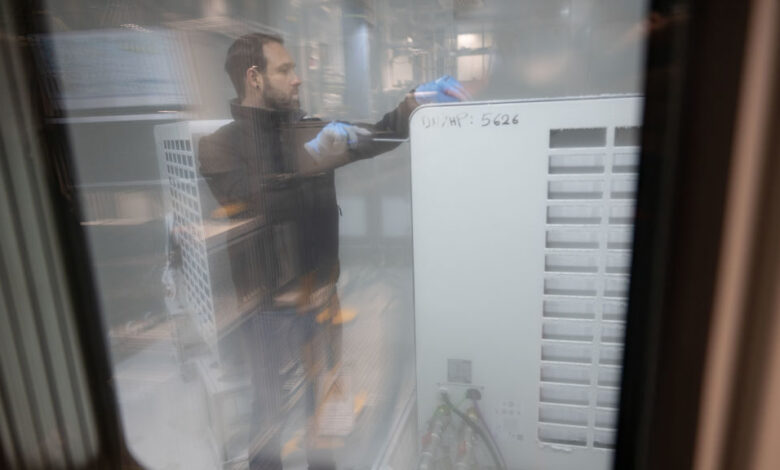
A Bosch Thermotechnik GmbH employee opens the housing of a Bosch heat pump in a climate chamber. Bosch heat pumps are tested in the cold chamber. At temperatures well below freezing, various tests are carried out to simulate everyday operation in cold weather conditions, 31.01.2023, Baden-Württemberg, Germany. Photo Credit: Picture Alliance/Getty Images
EnvironmentTechnology EuropeClean Energy Boost: a Heat Pump Revolution
With European countries facing an energy crisis, heat pumps could very well be the solution to break their dependence on Russian gas, while turning to cleaner energy sources and slashing their greenhouse gas emissions.
According to German think tank Agora Energiewende’s estimates, if a widespread conversion to heat pumps – for residential, commercial, and industrial use – happens and efficiency measures are taken, the EU could cut its natural gas use by 32% in five years. If liquid natural gas supplies increase, Europe could cut its need for Russian gas all together.
Heat pump demand in Germany, the largest European consumer of Russian gas, jumped 52% in 2022. Wienerberger, the world’s largest brick producer, is currently installing similar pumps and has foundries in the Netherlands, the UK, Poland, Romania, and Austria. Already popular for residential use, a growing number of industries are turning to heat pumps for their heating and cooling needs. Industrial versions use wasted “process energy” from factories as their source of power, meaning that pumps use 80% less energy than gas. And should the pumps run on solar, wind, hydropower, or waste heat, they emit no emissions at all. Heavy-duty heat pumps are used in a wide variety of businesses including hotels, restaurants, warehouses, swimming pools, and chemical manufacturing. In western Germany, chemical giant BASF’s Ludwigshafen site will be turned into the world’s largest heat pump where waste heat of cooling processes will be used to produce 150 tons of steam per hour, preventing some 390,000 tons of carbon dioxide from reaching the atmosphere every year. The EU is looking to slash its greenhouse gas emissions by at least 55% by 2030. Should Europe convert to heat pumps, it could cut 60 billion euros off its gas imports. According to the International Energy Agency, heat pumps should meet most of the world’s heating and cooling needs by 2050.



